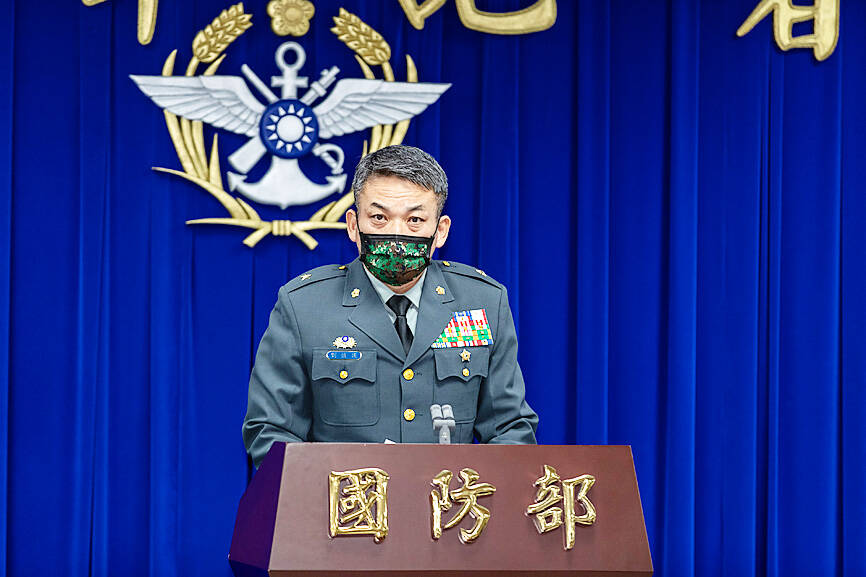New voluntary military recruits are to undergo more intense and longer training from next year to boost their combat preparedness, the Ministry of National Defense announced yesterday.
Major General Liu Shen-mo (劉慎謨), director of the Office of the Deputy Chief of the General Staff for Training’s Military Training Division, told reporters that the system as it is has new voluntary military recruits undergoing 230 hours of training over five weeks.
However, from Jan. 1, boot camp is to be extended to eight weeks with the total training hours increased to 380, Liu said.

Photo courtesy of the Ministry of National Defense
Aside from what is taught in the existing program such as combat skills and weapons use, the new program is to include health management, pressure resistance, sports science, survival skills and casualty care, among others, he said.
The new recruits would also spend more time on marksmanship, he said.
Currently, recruits need to fire 86 rounds in a prone position, but from next month they would need to fire 160 rounds while standing, prone and kneeling, with nighttime firing added, Liu said.
After completing the eight-week course, the recruits would be assigned to military units for further training as they begin their service, he added.
However, the change would not affect compulsory military training, with conscripts to undergo a five-week boot camp before being assigned to field units.
The nation’s military is a mainly volunteer force, with conscripts serving supporting roles. Taiwan has about 215,000 troops.
As of last year, there were 160,000 voluntary military personnel.
The decision to change the boot camp training program was to meet “the needs of modern warfare and learn from the experience of other more advanced countries,” Liu said, without elaborating.
As for extending the duration of mandatory service to one year, ministry spokesman Sun Li-fang (孫立方) said that the policy would have far-ranging effects and preparations are under way for its implementation.
More detailed plans would follow once they are known, Sun said.
The Act of Military Service System (兵役法) stipulates that reverting to one year of mandatory service would require one year of advance notice, meaning that if the notice is not announced this year, the planned 2024 implementation date would be postponed to 2025.
Experts yesterday urged the government to make its policy decisions known as soon as possible, as it would help ministries and the public prepare accordingly.
Institute of National Defense and Security Research fellow Su Tzu-yun (蘇紫雲) said that China’s military is becoming more advanced, while recruitment in Taiwan is facing the added challenge of a falling birthrate.
Chen Kuo-ming (陳國銘), editor of the Chinese-language Defence International magazine, said that the chances an announcement to lengthen compulsory service would be made before the end of this year are high, but it is also important to outline how training would change.
Extending service would allow conscripts more time to hone their infantry, logistics and maintenance skills, Chen said, adding that while it would be difficult for conscripts to operate armored vehicles, they would still be adequate foot soldiers in the event of an invasion.

CHAOS: Iranians took to the streets playing celebratory music after reports of Khamenei’s death on Saturday, while mourners also gathered in Tehran yesterday Iranian Supreme Leader Ayatollah Ali Khamenei was killed in a major attack on Iran launched by Israel and the US, throwing the future of the Islamic republic into doubt and raising the risk of regional instability. Iranian state television and the state-run IRNA news agency announced the 86-year-old’s death early yesterday. US President Donald Trump said it gave Iranians their “greatest chance” to “take back” their country. The announcements came after a joint US and Israeli aerial bombardment that targeted Iranian military and governmental sites. Trump said the “heavy and pinpoint bombing” would continue through the week or as long

TRUST: The KMT said it respected the US’ timing and considerations, and hoped it would continue to honor its commitments to helping Taiwan bolster its defenses and deterrence US President Donald Trump is delaying a multibillion-dollar arms sale to Taiwan to ensure his visit to Beijing is successful, a New York Times report said. The weapons sales package has stalled in the US Department of State, the report said, citing US officials it did not identify. The White House has told agencies not to push forward ahead of Trump’s meeting with Chinese President Xi Jinping (習近平), it said. The two last month held a phone call to discuss trade and geopolitical flashpoints ahead of the summit. Xi raised the Taiwan issue and urged the US to handle arms sales to

BIG SPENDERS: Foreign investors bought the most Taiwan equities since 2005, signaling confidence that an AI boom would continue to benefit chipmakers Taiwan Semiconductor Manufacturing Co’s (TSMC, 台積電) market capitalization swelled to US$2 trillion for the first time following a 4.25 percent rally in its American depositary receipts (ADR) overnight, putting the world’s biggest contract chipmaker sixth on the list of the world’s biggest companies by market capitalization, just behind Amazon.com Inc. The site CompaniesMarketcap.com ranked TSMC ahead of Saudi Aramco and Meta Platforms Inc. The Taiwanese company’s ADRs on Tuesday surged to US$385.75 on the New York Stock Exchange, as strong demand for artificial intelligence (AI) applications led to chip supply constraints and boost revenue growth to record-breaking levels. Each TSMC ADR represents

State-run CPC Corp, Taiwan (CPC, 台灣中油) yesterday said that it had confirmed on Saturday night with its liquefied natural gas (LNG) and crude oil suppliers that shipments are proceeding as scheduled and that domestic supplies remain unaffected. The CPC yesterday announced the gasoline and diesel prices will rise by NT$0.2 and NT$0.4 per liter, respectively, starting Monday, citing Middle East tensions and blizzards in the eastern United States. CPC also iterated it has been reducing the proportion of crude oil imports from the Middle East and diversifying its supply sources in the past few years in response to geopolitical risks, expanding